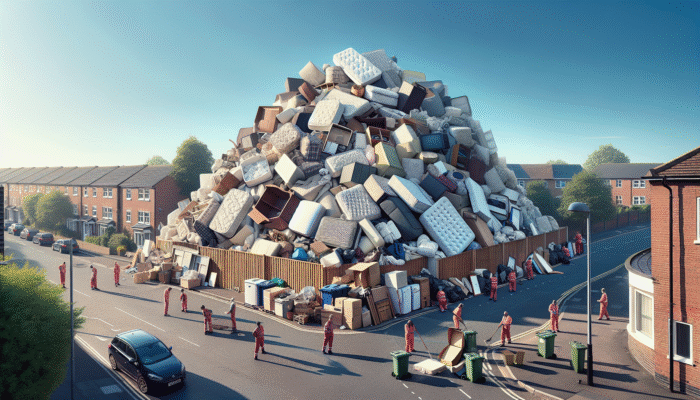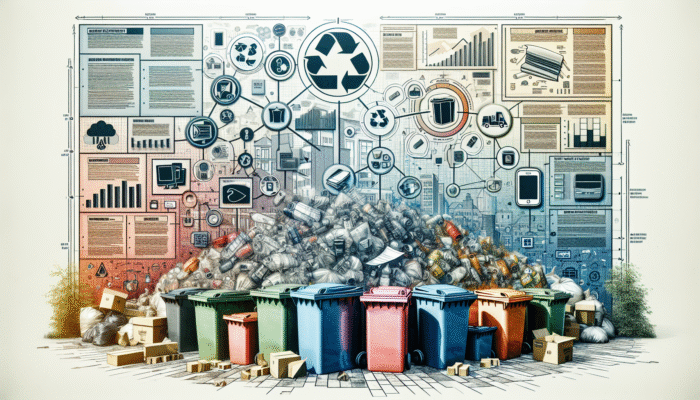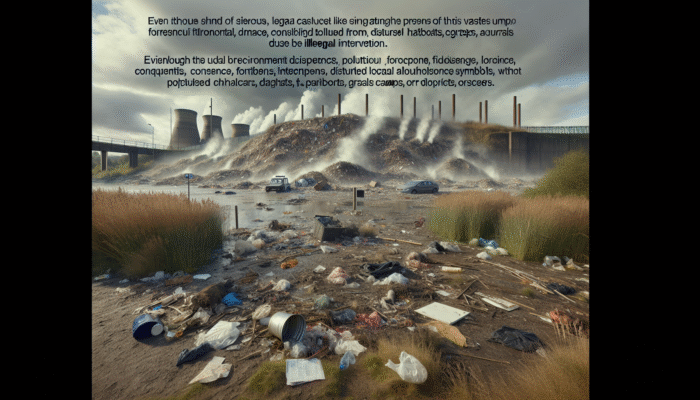Your Comprehensive Guide to Efficient Bulky Waste Management in the UK
Defining Bulky Waste: Key Characteristics and Environmental Implications

Bulky waste is defined as large items that cannot be disposed of through standard household waste bins due to their considerable size and weight. This category includes oversized furniture, large electrical appliances, and items such as mattresses. In the UK, it's essential to grasp what constitutes bulky waste, as local councils implement specific regulations governing its collection and disposal. Recognising this definition not only aids households in managing their waste more effectively but also aligns with the overarching goal of sustainable waste management. By understanding the implications surrounding bulky waste, individuals can undertake proactive measures to ensure that these items do not adversely affect the environment or contribute to its degradation, thereby promoting ecological balance.
Understanding the characteristics of bulky waste empowers individuals to make informed decisions regarding its disposal. Instead of merely discarding these items, residents can investigate alternatives such as recycling or reusing, significantly alleviating the pressure on landfill sites. The classification of bulky waste encompasses a diverse array of items, encouraging households to be vigilant about what qualifies, thus enabling them to discover appropriate disposal methods that adhere to environmental standards and regulations. By being proactive, individuals contribute positively to their communities and the planet, fostering a culture of environmental responsibility.
Identifying Common Bulky Waste Items in UK Households
The range of bulky items frequently found in UK homes includes sofas, armchairs, fridges, washing machines, and large televisions. These substantial items not only occupy considerable space within homes but are also generally cumbersome to transport, necessitating special handling during their disposal. Most households will inevitably encounter bulky waste at various times, whether due to routine decluttering, relocating to a new residence, or the natural deterioration of items over time.
Sofas and armchairs are particularly common, as families often invest in new furniture to accommodate changing needs or evolving design trends. Similarly, appliances such as fridges and washing machines have finite lifespans and need replacement when they become outdated. With the rapid technological advancements, older televisions are often discarded in favour of more modern models. By being aware of the types of bulky items typically present in homes, residents can make better-informed decisions regarding disposal options, facilitating effective recycling and minimising their environmental impact.
The Crucial Role of Recycling Bulky Waste in Promoting Environmental Sustainability
The importance of recycling bulky waste cannot be overstated, particularly regarding environmental conservation. Adequate disposal of these large items can significantly diminish the volume of waste directed to landfills, consequently reducing the emission of harmful greenhouse gases. Recycling bulky items enables the reclamation of valuable materials, positively influencing the manufacturing process and lessening the demand for new resources, thus promoting a more sustainable approach to production and consumption.
Moreover, participating in the recycling of bulky waste cultivates a sustainable ecosystem. Resources such as metal, wood, and plastic can be repurposed, conserving both natural resources and energy. This recycling initiative not only mitigates waste but also fosters a culture of sustainability within communities. Actively engaging in the recycling of bulky items during house clearances is a vital aspect of our collective responsibility to safeguard the planet for future generations, ensuring a healthier environment for all.
Understanding UK Legislation Regarding Bulky Waste Disposal

Exploring the Waste Framework Directive: A Foundation for Sustainable Waste Management
The Waste Framework Directive is a critical piece of legislation that shapes waste management practices throughout the UK, providing a comprehensive framework for the sustainable treatment of waste, including bulky items. This directive advocates for waste prevention, recycling, and recovery, ensuring that waste treatment is executed in an environmentally responsible manner. Under this directive, the UK is dedicated to reducing its reliance on landfills and enhancing recycling rates, which directly influences how bulky waste is managed nationwide, promoting a more circular economy.
This legislation obliges member states to implement measures that encourage waste recycling and recovery, aiming to improve resource efficiency. The focus on recycling bulky items aligns with broader European goals aimed at establishing a circular economy, where materials are reused and waste generation is minimised. By comprehending the implications of the Waste Framework Directive, UK residents can become more aware of their waste management responsibilities and the legal frameworks that dictate waste disposal, guiding their actions toward compliance and sustainability.
Local Authority Regulations: Tailored Approaches to Managing Bulky Waste
In the UK, local authorities play a pivotal role in managing the disposal of bulky waste. Each council implements its unique regulations and services tailored to the specific needs of their community. Some councils offer complimentary collection services for bulky items, while others may impose a fee for this service. The procedures for arranging a collection can vary significantly; for instance, some councils require appointments to be made online or via telephone, while others may provide drop-off facilities for residents to utilise.
Local authorities hold the responsibility of ensuring that bulky waste is disposed of correctly and legally, which includes promoting recycling initiatives within their jurisdictions. Many councils provide comprehensive information on how to recycle specific items, contributing to educational campaigns that raise awareness about responsible disposal practices. By familiarising themselves with these regulations, households can fully leverage the services offered by their local councils, ensuring compliance while minimising the overall amount of waste sent to landfills, thereby fostering a cleaner environment.
The Risks of Illegal Dumping: Legal Repercussions and Community Consequences

Engaging in the illegal dumping of bulky waste is a serious offence in the UK, attracting substantial fines and potential legal consequences. Local authorities possess the authority to impose penalties for littering or disposing of waste in unauthorised areas, highlighting the importance of adhering to proper disposal practices. This legislation seeks to protect both the environment and public health, ensuring that waste is managed safely and responsibly, thereby contributing to community wellbeing.
The financial consequences of illegal dumping can be severe, as councils may impose escalating fines for repeated violations, resulting in costly repercussions for individuals or businesses involved. Furthermore, illegal dumping leads to environmental degradation and adversely affects local communities, creating unsightly landscapes and potential hazards. Awareness of these penalties serves as a strong deterrent, motivating individuals to utilise legal disposal methods for bulky items and engage in responsible recycling practices that benefit both the community and the environment.
National Waste Management Plans: Strategic Frameworks for Responsible Waste Management
The UK government has developed National Waste Management Plans to comprehensively address waste issues, including targeted strategies for bulky waste items. These plans outline goals and methodologies for waste management across the nation, aiming to enhance recycling rates and reduce reliance on landfills. By establishing clear targets, the government fosters a commitment to sustainable practices among local authorities and the general populace, ensuring that everyone plays a role in effective waste management.
These management plans typically incorporate guidelines for the collection, recycling, and disposal of bulky waste, ensuring that sufficient resources and infrastructure are in place to support effective waste management practices. They also emphasise the importance of collaboration among authorities, businesses, and communities in achieving waste reduction objectives. By understanding these plans, residents can empower themselves to take an active role in waste management, contributing positively to a sustainable future for their communities and the planet.
Exploring Efficient Recycling Options for Bulky Items in the UK
Leveraging Local Council Collection Services for Responsible Bulky Waste Disposal
Local councils throughout the UK provide invaluable services for the collection of bulky items, facilitating responsible disposal for residents. Many councils offer complimentary collection services, while others may charge a nominal fee for this convenience. The specifics of these services, including scheduling and item eligibility, can vary considerably from one council to another, making it essential for residents to consult their local authority for the most accurate and updated information.
These collection services not only streamline the responsible disposal of bulky items but often integrate recycling initiatives as well. Once collected, bulky waste may be transported to specialised facilities where it is sorted, recycled, or disposed of in an environmentally friendly manner. By utilising these services, residents contribute to the broader goal of reducing landfill waste and fostering a sustainable environment for future generations, ensuring that their actions align with community and ecological interests.
Additionally, local councils frequently conduct community awareness campaigns that underscore the significance of recycling bulky waste. By engaging with these council-led initiatives, households can play a substantial role in local sustainability efforts, reinforcing community ties and promoting responsible waste management practices among neighbours, thus creating a collective impact on environmental preservation.
Maximising the Use of Recycling Centres: Tips for Efficient Waste Management
Household Waste Recycling Centres (HWRCs) and tips located throughout the UK serve as essential venues for recycling bulky items. These facilities accept a broad spectrum of items, including furniture and appliances, and are equipped to handle large waste efficiently. Many centres require residents to pre-book their visits, which aids in managing traffic flow and ensuring that facilities are not overwhelmed by excessive volumes of waste.
At these recycling centres, bulky items undergo careful sorting and processing, enabling various materials to be recycled or repurposed effectively. This meticulous approach not only conserves resources but significantly reduces the amount of waste that ultimately finds its way into landfills. By taking advantage of local HWRCs, individuals can ensure that their bulky waste is managed in an environmentally friendly manner, contributing positively to sustainable practices within their communities while encouraging a culture of recycling.
Moreover, recycling centres often provide educational resources pertaining to recycling and waste management. This information empowers residents to make informed decisions about their waste, fostering a culture of sustainability that benefits the entire community and encourages responsible consumer behaviours, ultimately leading to a greener future.
Collaborating with Private Recycling Companies for Flexible Disposal Solutions
In addition to local council services, numerous private recycling companies in the UK specialise in the collection and recycling of bulky items. These companies typically offer convenient pick-up services, simplifying the process of disposing of large waste for residents. Many of these businesses are committed to environmentally responsible practices, ensuring that items are recycled or repurposed rather than ending up in landfill sites, thus aligning with sustainability goals.
Private recycling companies may offer greater flexibility compared to local authorities, providing options such as same-day collection or personalised service packages tailored to meet individual needs. This adaptability can be particularly beneficial for businesses, landlords, or individuals undergoing house clearances. By partnering with these companies, residents can ensure that their bulky items are recycled efficiently, thus supporting both local economies and environmental sustainability efforts.
Furthermore, many private recycling firms actively promote awareness of the importance of recycling bulky waste. Their initiatives often encompass educational campaigns and partnerships with local governments, enhancing community efforts towards sustainable waste management practices. Choosing to engage with these companies can significantly boost recycling rates and positively impact the environment, reinforcing a collective commitment to responsible waste disposal and sustainable living.
Key Steps for Preparing Bulky Items for Recycling
The Importance of Disassembling Furniture for Enhanced Recycling
When preparing bulky items for recycling, disassembling furniture is a vital step that can substantially improve the recycling process. Large items such as beds and tables can be challenging to transport if they remain intact. Breaking these items down into smaller components facilitates easier handling and processing by collection services, ensuring a more efficient recycling experience.
Disassembling furniture not only simplifies logistics but also increases the value of the materials for recyclers. Many components, including wood, metal, and fabric, possess recycling potential and can be repurposed across various industries. For example, metal frames can be melted down and reused, while wood may be transformed into new products or utilised in biomass energy. This practice conserves space in landfills and promotes a cycle of reuse that benefits the environment while fostering sustainable consumer habits.
Moreover, disassembled items can be stored and transported more efficiently, enabling residents to manage their space effectively. Whether preparing for a house clearance or a general declutter, breaking down furniture is a proactive approach that ensures responsible recycling practices are followed, aligning with broader sustainability goals and community standards.
Cleaning and Removing Hazardous Components: Ensuring Safe Recycling Practices
Another critical aspect of preparing bulky items for recycling involves thoroughly cleaning and removing hazardous components. Items like appliances may contain materials that pose environmental risks, such as batteries, refrigerants, or electronic parts. Properly removing these hazardous components is essential to ensure that the recycling process is both safe and compliant with relevant regulations, thereby protecting both the environment and public health.
Cleaning bulky items not only enhances their presentation for recycling but significantly increases their likelihood of reuse. For instance, a clean and intact appliance is far more likely to be refurbished and resold than one that is dirty or damaged. By taking the time to clean and remove hazardous materials, individuals contribute to safer recycling practices and improve the chances of their items being repurposed effectively, thereby minimising waste and fostering a responsible community.
Moreover, many recycling facilities have specific guidelines for item preparation, including instructions related to hazardous waste. Familiarising oneself with these guidelines ensures that the recycling process is efficient and that all materials are handled appropriately. This preparation is not merely a responsible practice; it signifies a commitment to environmental stewardship and community well-being, reinforcing the significance of sustainable waste management in today’s society.
Optimising the Recycling Process through Labelling and Sorting
Effective labelling and sorting of bulky items can significantly enhance the recycling process. By clearly identifying different materials and components, individuals improve the efficiency of processing at recycling facilities. For instance, separating wood from metal or textiles helps recyclers manage materials effectively, ensuring that each component is directed to the appropriate recycling stream, thus maximising recovery rates.
Proper labelling also aids in compliance with local regulations, as many councils and recycling centres have specific guidelines regarding how materials should be prepared for collection or drop-off. This organisation can elevate the overall recycling rate within communities, as well-sorted materials are often more likely to be recycled rather than sent to landfill, promoting responsible waste management practices.
Additionally, engaging in the labelling and sorting process fosters a culture of accountability and responsibility among residents. It encourages individuals to think critically about their waste and the lifecycle of their items, ultimately contributing to a more sustainable approach to waste management. By actively participating in this practice, residents can play a vital role in reducing waste and promoting recycling efforts within their communities, reinforcing the significance of sustainable living and environmental protection.
Maximising Opportunities for Donating and Reusing Bulky Items
Supporting Charities and Second-Hand Shops through Generous Donations
One of the most impactful strategies for managing bulky items is donating them to charities and second-hand shops. Numerous organisations across the UK welcome donations of furniture, appliances, and other large items, granting them a second life while simultaneously supporting worthy causes. Charitable organisations often depend on these donations to fund their initiatives, creating a mutually beneficial arrangement for both donors and recipients.
Donating to charity not only provides individuals with a sense of fulfilment but also aids in reducing clutter and waste in their homes. For those seeking to dispose of items responsibly, this option is often the most compassionate choice available. Charities such as the British Heart Foundation or local community shops actively seek donations of bulky items and possess the infrastructure necessary to collect them, simplifying the process for residents and ensuring that their contributions reach those in need.
The environmental advantages are significant as well. By opting to donate instead of discard items, individuals prevent valuable resources from ending up in landfills, conserving energy and reducing their overall carbon footprint. This practice encourages a culture of reuse and sustainability, emphasising the importance of community-oriented waste management initiatives that benefit society as a whole and contribute to a healthier planet.
Leveraging Online Platforms for the Reuse of Bulky Items
In today’s digital age, online platforms like Freecycle and Gumtree have emerged as invaluable tools for the reuse of bulky items. These platforms provide a venue where individuals can offer items they no longer need, facilitating connections with people actively seeking those specific items. This practice not only helps divert waste from landfills but also allows valuable items to find new homes where they will be appreciated and utilised effectively.
Engaging with these platforms fosters a sense of community and resource sharing, as neighbours can support one another in their pursuit of sustainable living. Posting items for free can encourage quick take-up, enabling residents to declutter their homes while ensuring that their unwanted items are reused rather than discarded, reinforcing the value of community engagement.
Moreover, these platforms often highlight the environmental benefits of reusing items, underscoring the impact of waste and the importance of sustainability. By participating in these online communities, individuals can contribute to a circular economy, where products remain in use for extended periods, thereby decreasing the demand for new resources and the associated environmental consequences of manufacturing processes.
Participating in Community Reuse Schemes for Effective Bulky Waste Management
Local community reuse schemes represent an excellent avenue for recycling bulky items, often collaborating with local authorities and charitable organisations. These schemes focus on collecting and redistributing furniture and other bulky items to individuals in need, effectively preventing waste while providing support to vulnerable families and individuals in the community.
These community initiatives can vary in scope but typically involve partnerships with local charities, schools, and civic organisations. By pooling resources, these schemes can efficiently collect and redistribute bulky items, ensuring that they reach those who can benefit from them. Supporting or participating in these initiatives reinforces the importance of community, sustainability, and social responsibility in waste management practices, creating a network of support that enhances overall wellbeing.
Through community reuse schemes, residents can easily offload unwanted bulky items without the environmental guilt associated with sending them to landfills. Such initiatives provide practical solutions for waste management while strengthening community ties, fostering a culture of responsibility and compassion within society. Engaging in these schemes is a proactive step towards cultivating a sustainable and supportive community that prioritises responsible waste management and environmental care.
Utilising Local Authority Services for Efficient Bulky Waste Collection
Many local councils in the UK provide specific services for collecting bulky waste, simplifying the process for residents to dispose of large items responsibly. Council-led bulky waste collection services often come with a fee, but they offer a convenient method for homeowners to declutter without the hassle of transporting items themselves, thereby promoting responsible waste management practices.
These services are designed to ensure responsible disposal and recycling of bulky items, guaranteeing that they are managed appropriately after collection. Councils typically collaborate with recycling facilities to ensure that items are sorted and processed according to established regulations, promoting a sustainable approach to waste management that aligns with national objectives and community standards.
Utilising local authority services not only assists individuals in managing their waste but also contributes to the broader community goal of reducing landfill use and increasing recycling rates. By taking advantage of these services, residents can ensure that their bulky items are recycled effectively, thus supporting local sustainability initiatives while decluttering their homes responsibly and positively impacting the environment.
Collaborating with Furniture Reuse Networks for Community Support
Furniture Reuse Networks across the UK play a crucial role in collecting and redistributing donated furniture to those in need. These organisations focus on preventing waste while assisting individuals and families who may lack access to essential furniture items. By connecting donors with those in need, these networks promote a culture of reuse and sustainability that benefits the entire community, enhancing social welfare.
The operational model of Furniture Reuse Networks typically involves the collection of donated items, which are then cleaned, refurbished, and distributed to individuals requiring assistance. This process not only supports community members but also significantly reduces the amount of waste that ultimately ends up in landfills, thereby contributing to environmental conservation efforts and promoting responsible consumption habits.
Engaging with these networks allows residents to dispose of their bulky items responsibly while making a tangible impact on their community. By donating furniture and other items, individuals can help bridge the gap for those in need, ensuring that essential goods remain accessible to everyone. This approach reinforces the importance of social responsibility in waste management, cultivating a sense of interconnectedness within communities and promoting a sustainable future that benefits all.
Case Studies Showcasing Successful Bulky Item Recycling Initiatives
Innovative Furniture Reuse Project in Manchester: A Model of Community Collaboration
In Manchester, a pioneering project has been launched to tackle the issue of bulky waste through effective recycling and redistribution of furniture. This initiative centres around collecting unwanted furniture from households and refurbishing it for reuse within the community, significantly reducing landfill waste while providing affordable furniture options for those in need, particularly low-income families and individuals.
The success of this initiative is attributable to strong partnerships forged with local charities, community organisations, and dedicated volunteers. Through effective collaboration, they have established a streamlined process for collecting, refurbishing, and distributing furniture items. Residents are encouraged to donate their unwanted furniture, which is then assessed for quality before being repaired and cleaned as necessary, ensuring that only high-quality items are provided to those in need, fostering a sense of community support.
The impact of this programme extends beyond mere waste reduction; it cultivates community spirit and provides essential resources for those who might otherwise struggle to afford basic furnishings. By showcasing the benefits of recycling bulky items, this initiative serves as an exemplary model for other cities across the UK and beyond, inspiring similar projects that promote sustainability, social responsibility, and community resilience.
Appliance Recycling Initiative in London: A Blueprint for Eco-Friendly Practices
In London, an innovative initiative focuses on the recycling of old appliances, significantly reducing landfill waste while recovering valuable materials. This programme encourages residents to recycle their end-of-life appliances, such as fridges, washing machines, and microwaves, through a network of collection services and recycling centres designed to facilitate responsible disposal and promote environmental sustainability.
The initiative highlights the necessity of responsible disposal and recycling of appliances, many of which contain hazardous materials that can adversely affect the environment if not managed correctly. By promoting public awareness and providing convenient collection options, the initiative has successfully diverted thousands of appliances from ending up in landfills, fostering a culture of sustainability among residents and encouraging responsible consumer behaviours.
Through this programme, valuable materials, including metals and plastics, are recovered and reintegrated into the manufacturing process, contributing to the establishment of a circular economy. The positive outcomes of this initiative extend beyond waste reduction; it also encourages London residents to critically evaluate their consumption and disposal habits, ultimately promoting a more responsible and eco-conscious community that values sustainable living.
Successful Mattress Recycling Programme in Birmingham: A Case Study in Innovation
Birmingham’s mattress recycling programme serves as an exemplary model for effectively managing bulky waste. The initiative revolves around breaking down old mattresses into their component parts, such as springs, fabric, and foam, which can then be recycled or reused. Given that mattresses often pose significant challenges for recycling due to their size and composition, this project represents a substantial advancement in waste management efforts, demonstrating innovative practices.
The programme operates by offering dedicated collection services for old mattresses, ensuring they are transported to specialised recycling facilities. Here, the mattresses are systematically dismantled, allowing various materials to be processed and transformed into new products. This method not only prevents mattresses from being discarded in landfills but also significantly contributes to resource conservation and sustainability efforts, promoting a more responsible approach to waste management.
The success of Birmingham’s mattress recycling initiative illustrates the potential for effective recycling schemes to manage bulky waste sustainably. By implementing such programmes, cities can markedly reduce environmental impacts while fostering responsible consumption habits among residents. This case study serves as a blueprint for other cities aiming to creatively and effectively tackle the issue of bulky waste while promoting community involvement and environmental stewardship.
Raising Public Awareness on the Importance of Bulky Waste Recycling
In addition to these successful case studies, educational initiatives play a vital role in raising awareness about bulky waste recycling. Cities across the UK are investing in campaigns to inform residents about the importance of recycling bulky items and the various options available for responsible disposal, thereby promoting community engagement and collective responsibility.
These educational efforts often encompass workshops, community events, and online resources that explain the recycling process, the benefits of responsible waste management, and the environmental impact of improper disposal. By empowering individuals with knowledge, cities can cultivate a culture of sustainability that encourages residents to actively engage in recycling and reuse behaviours, fostering a more environmentally responsible community that values collective action towards environmental preservation.
The ongoing education of the public regarding bulky waste recycling is crucial for the success of these initiatives. As more individuals become aware of their options and the significance of sustainable practices, communities can collaborate to reduce waste and promote a healthier environment for future generations, ensuring a better world for all through informed and responsible waste management.
Frequently Asked Questions About Bulky Waste Management
What items are classified as bulky waste?
Bulky waste refers to large items that cannot fit in standard bins, including furniture, appliances, and mattresses, necessitating special disposal methods for effective management.
What are the proper disposal methods for bulky items in the UK?
Residents can dispose of bulky items through local council collection services, recycling centres, or private recycling companies that specialise in effectively managing bulky waste, ensuring compliance with environmental regulations.
What are the repercussions of illegally dumping bulky waste?
Yes, illegal dumping of bulky waste can result in significant fines and potential legal action under UK environmental laws designed to safeguard public health and the environment from harm, thereby promoting responsible waste management.
Is it possible to donate my bulky items instead of discarding them?
Absolutely! Many charities and second-hand shops in the UK welcome donations of bulky items, providing them with a second chance while supporting community needs and initiatives, fostering a culture of reuse.
What advantages does recycling bulky items provide?
Recycling bulky items helps reduce landfill usage, conserves natural resources, and promotes a sustainable environment by reintegrating materials back into the manufacturing cycle, benefiting society as a whole and contributing to ecological balance.
How do local councils manage the collection of bulky waste?
Local councils typically offer collection services that may be free or charged, ensuring that collected items are either recycled or disposed of in an environmentally responsible manner, compliant with established regulations.
What steps should I take to prepare bulky furniture for recycling?
Before recycling bulky furniture, it’s advisable to disassemble it if possible, clean it thoroughly, and remove any hazardous components to ensure safe and effective recycling practices that align with sustainability goals.
What online platforms can I use to give away bulky items?
Websites such as Freecycle and Gumtree allow residents to donate or sell bulky items, promoting reuse within the community while effectively reducing waste and enhancing community engagement.
Are community reuse schemes available in the UK for bulky items?
Yes, many local areas have established community reuse schemes that collect and redistribute bulky items to individuals in need, often in collaboration with charitable organisations to maximise their impact and foster community support.
How does Birmingham’s mattress recycling programme operate?
Birmingham’s mattress recycling programme collects old mattresses and dismantles them into reusable components, successfully preventing them from contributing to landfill waste while fostering sustainability efforts and promoting responsible waste management practices.
Join the Conversation on Facebook!
The Article: Recycling Bulky Items in House Clearance: A UK Guide Was First Found At https://birminghamhouseclearance.com
The Article Recycling Bulky Items: Your UK House Clearance Guide Was Found On https://limitsofstrategy.com


I really appreciate this deep dive into bulky waste management! It’s fascinating how much we take for granted the ease of waste disposal until it comes to these larger items. I recently had to deal with an old sofa, and it made me realize how little we know about the right ways to handle bulky waste. It felt overwhelming at first, navigating local council rules and trying to figure out if I should book a collection or try to donate it.
It’s interesting how dealing with bulky waste can really open up a whole new world of logistics that most of us don’t think about regularly. That experience with your old sofa highlights a common struggle. Many people don’t know how to approach it until they face it themselves.
You’re right; dealing with bulky waste really is a logistical challenge that most of us don’t consider until we have to, often at the most inconvenient times. It can feel overwhelming at first, especially navigating the options like recycling, donation, or just figuring out who can help haul a heavy item away.